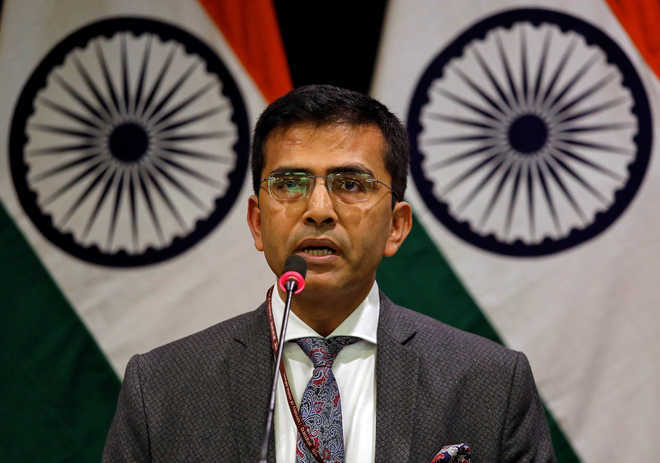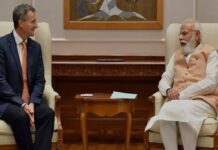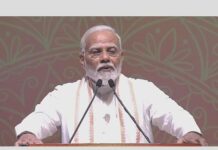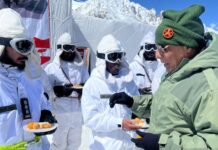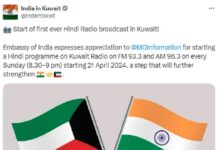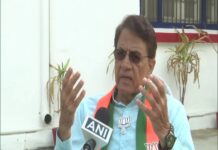AROONIM BHUYAN
India Post News Service
NEW DELHI: India Thursday said that the world has rejected Pakistan’s attempt to polarize and politicize the Kashmir at the UN Human Rights Council (UNHRC) in Geneva and slammed Islamabad for pretending to speak on behalf of the global community on human rights.
“Two or three things became very clear,” External Affairs Ministry spokesperson Raveesh Kumar said at a media briefing here. “The first is Pakistan’s attempt to polarize and politicize the situation,” Kumar said. “That has been rejected. The global community is aware of Pakistan’s role in aiding, abetting and supporting terrorist infrastructure which they have in their country.”
Secondly, the spokesperson said, “in a case of doublespeak, it is quite audacious on the part of Pakistan that the country which is harboring terrorists, which is the epicenter of terrorism, is pretending to speak on behalf of the global community on human rights”.
“Their record of persecution of minorities, both ethnic and religious, I don’t think I need to explain and amplify. I think they need to understand that repeating a lie four or five times does not turn it into gospel truth.” Kumar’s remarks come two days after India gave a strong rebuttal to Pakistan’s offensive on Kashmir at the 42nd Session of the UNHRC.
The Indian Parliament in August abrogated Articles 370 and 35A of the Indian Constitution that gave special rights to Jammu and Kashmir and bifurcated the northern state into two union territories – Jammu and Kashmir, and Ladakh – that will be directly governed by the central government in New Delhi. Pakistan reacted sharply by downgrading diplomatic ties and bilateral trade with India and expelling the Indian high commissioner among other retaliatory measures.
India has maintained the abrogation of Articles 370 and 35A is a purely internal matter and told Pakistan to accept the reality and behave like a normal neighbour. Pakistan has been desperately trying to draw the attention of the international community, particularly the Muslim world, citing human rights abuses following the change of status of Jammu and Kashmir.
Islamabad has also used the threat of war against India and said that it may not help in the fight against terrorism in Afghanistan in desperate efforts to internationalize the Kashmir issue.
However, all countries have remained silent on the issue inferring an acceptance of India’s position that Kashmir is an internal issue. As for the current situation in Kashmir, Kumar said that, as of Wednesday, essential supplies, including 24×7 electricity, water supply, healthcare, and sanitation were being ensured.
“Hospitals and medical facilities are functioning normally. There is no shortage of medicines. All 376 notified medicines and 62 essential medicines are available in adequate quantity. Essential medicine worth Rs 32 crore (around $5 Million) were received in Jammu and Kashmir between July 20 and August 23, 2019,” he said, adding six weeks reserve of all medicines are available in all government hospitals.
He said 95 per cent of health care professionals is on duty. “More than 400,000 patients have been attended for various ailments in the Outpatient Department with 35,000 patients admitted and 11,000 surgeries have been conducted since August 5.”
The spokesperson further said that 120,000 quintals of rice have been distributed over the last three weeks. A special cell with an emergency number has been established for people to report any genuine shortage. “Banking and ATM facilities operating normally and cash are regularly loaded so that the public do not face any difficulty,” he said. “More than $14 Million equivalent Indian rupees have been disbursed through J&K Bank ATMs alone.”
Stating that there is no shortage of cooking gas, Kumar said that 850,000 LPG cylinders have been distributed in Srinagar in the last three weeks. To put the scenario in perspective, Kumar said that 92 per cent of the area of Jammu and Kashmir have no restriction. “Earlier, restrictions had been imposed by the local administration in some parts to maintain law and order,” he said. “Some day time restrictions remain in only 11 of the total 199 Police Stations.”

